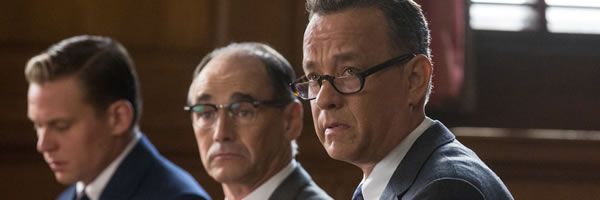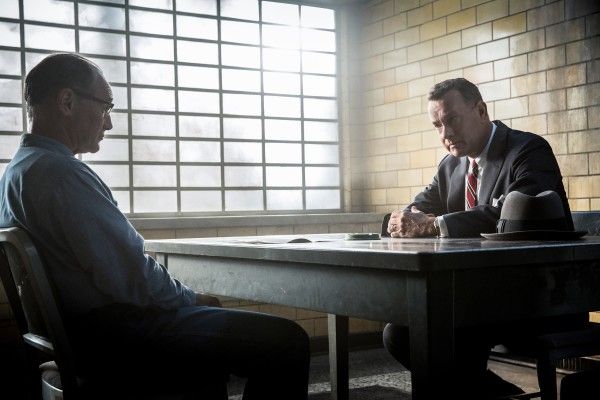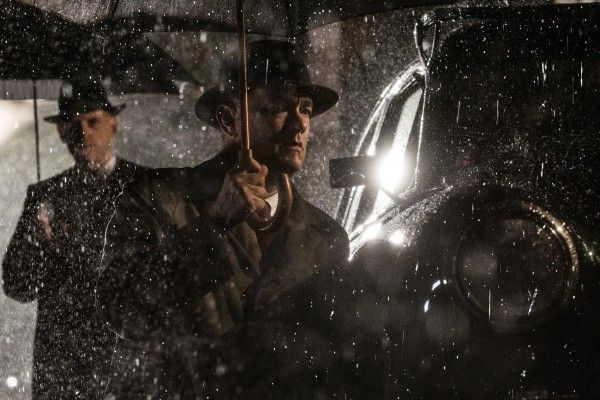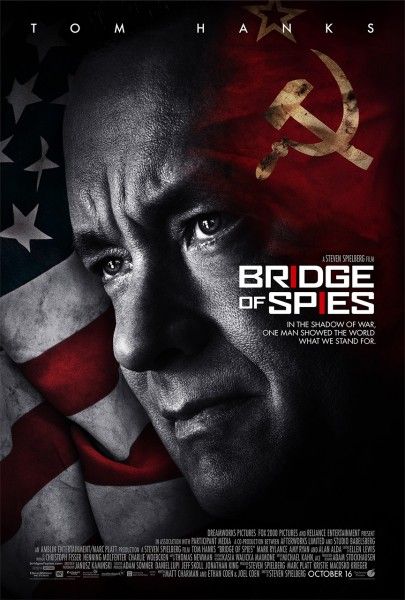It’s been three years since Lincoln hit theaters and snagged some Oscars, but Steven Spielberg is finally back with the much-anticipated historical epic, Bridge of Spies. He’s got a riveting true story, a Coen Brothers script and Tom Hanks leading the film. You can’t really go wrong with that combination, but it doesn’t guarantee Academy Award potential either. Bridge of Spies is a quality film featuring loads of commendable work, but Spielberg’s glossy and exceedingly upbeat take on the material might make it more of a crowdpleaser than an Oscar contender.
The film features Tom Hanks as James Donovan, a successful insurance lawyer who suddenly finds himself right in the middle of the Cold War. When the FBI nabs supposed Soviet spy, Rudolf Abel (Mark Rylance), the government calls upon Donovan to defend him in court. Even though the officials assume that Donovan will just put on a show and make it look like Abel is getting a fair trial, Donovan puts himself and his family at risk and commits to defending the most hated men in America to the best of his ability.
This is where Bridge of Spies excels. Hanks’ familiar nice-guy demeanor works well and enhances the entire movie, but what makes his performance in the first half particularly powerful is his chemistry with Rylance. Rylance barely gets a stitch of dialogue in the opening sequence, but because he’s got such a commanding on-screen presence, he quickly draws you in and then some spot-on editing and camerawork further insures that you’re watching his every move. Even when Abel starts getting chatty, and surprisingly funny, with Donovan, his quiet, thoughtful demeanor will have you hanging on his every word. In a curious and enjoyable paradox, Hanks manages to achieve the same while acting opposite Rylance as a verbose negotiator.
The only problem with the scenes featuring Hanks and Rylance is that they further highlight one of the film’s most glaring issues - Donovan is too noble. Abel seems like a gentleman, but could also be a national security threat, so there’s a need to read into everything he says and does. Donovan’s a standup family man and lawyer, and he remains a standup family man and lawyer throughout the entire film. If there’s a high road, you know he’s going to take it. For a movie that’s all about negotiating, it doesn’t feature much decision-making. A predicament pops up and we know exactly how Donovan will react. The suspense only comes in when it’s time to find out the consequences of his actions.
In addition to the situation with Abel, the US also has to figure out what to do about pilot Francis Gary Powers (Austin Stowell) who’s shot down and captured by the Soviet Union. Fearing that Powers may give up top secret information, the CIA asks Donovan to step in and negotiate a trade, Powers for Abel.
Hanks has no trouble getting you to root for Donovan to pull this seemingly impossible trade off but again, you’re still just watching him go through the motions. There’s no investment on a deeper level, and that issue is even more detrimental in the second half of the film because Stowell’s character isn’t half as compelling as Rylance’s. Stowell doesn’t give a poor performance, but he certainly doesn’t have the charisma to turn his thinly drawn character into a person you care about. As presented in the film, Powers is a one-dimensional solider who winds up in a sticky situation. You may want Donovan to save the day and make the trade, but not really for Powers’ sake.
How the negotiations affect our country as a whole is another issue. Again, Hanks makes for a powerful leading man so it’s only natural to want what he wants, however, it’s hard to ignore the fact that Donovan makes some pretty reckless decisions at the tail end of the film. Yes, you’re rooting for him to pull it off, but because you’re not part of Donovan’s decision making process, it’s impossible to get behind him 100% and look past the fact that his choices could come with devastating repercussions.
On the technical front, Spielberg, cinematographer Janusz Kaminski and the rest of the team deliver mostly stunning work. At times it does feel like Kaminski has a heavy hand on the camera, where certain pans, tracks, tilts, etc. don’t feel natural, but the shot composition is on point throughout. The lighting in Bridge of Spies is also quite the achievement, greatly contributing to the tone and style of the material.
Overall, Bridge of Spies is a fine film. It’s energetic, suspenseful and rocks some exceptional verbal sparring. However, it falls short of being a great rendition of Donovan’s story because it doesn’t let you experience it from Donovan’s perspective, more from a bird’s eye point of view, and without that extra layer and connectivity, it may be very entertaining but it can’t strike a chord on a deeper level.
Grade: B




